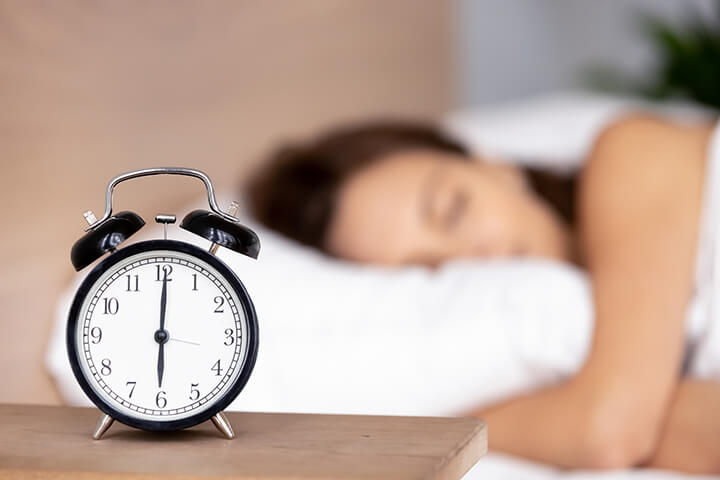There’s a long list of “lifestyle” factors that we know can affect the fertility of both women and men. From weight to smoking to stress, you can now add lack of sleep to the list. Sleep disorders likely increase the risk of infertility for both sexes.
According to the Centers for Disease and Control (CDC), lack of sleep – which more than one third of Americans experience – can affect the hormones related to fertility. The part of the brain that regulates “sleep-wake hormones” in both sexes is also responsible for triggering the daily release of hormones that affect ovulation in women and sperm maturation in men.
For women, losing sleep over the long term may have a direct effect on various reproductive-related hormones including estrogen, progesterone, prolactin, luteinizing hormone (LH), and follicle-stimulating hormone. For example, the release of LH is critical as this hormone is responsible for a regular menstrual cycle and ovulation. An irregular cycle may complicate or delay a woman’s ability to conceive.
With men, the hormone testosterone is critical to healthy sperm production. The hormone is released daily, usually during sleep. Optimal levels of testosterone are affected by several factors including sleep and total sleep time has been positively linked to testosterone levels in several studies, according to Lauren Wise, a Boston University researcher and professor of epidemiology.
While most of the research on sleep and fertility reveals a link between too little sleep or poor-quality sleep, too much sleep can also make a difference. Men who sleep either too little or too much may have problems with their fertility.
A study from Boston University’s School of Public Health looked at the appropriate level of sleep needed by couples to get pregnant. The results from 790 couples (all trying to get pregnant) showed:
- Sleep defined as short – less than 6 hours and as long – more than 9 hours, was associated with a “reduced probability” of pregnancy.
- Men who slept too little or too long had a 42% reduction in probability of conception in any given month, using 8 hours as a reference point.
- Men who self-reported trouble with sleep half the time also had the greatest problems getting their partner pregnant.
Study author Lauren Wise points out that her study shows an association between sleep and fertility but does not prove cause and effect. Poor sleep can affect libido and health status which can also impact fertility. However, the study did control for additional factors known to influence fertility including age, body mass index (BMI), frequency of sex and more. More research is needed according to Wise.
The research findings are good news according to Peter Schlegel, MD, chair of Urology at Weill Cornell Medicine in New York City and Past President of the American Society for Reproductive Medicine (ASRM), the professional society of fertility specialists. He notes there is little data about how men’s sleep affects their infertility.
To Schlegel, this study “strongly suggests that for men, aiming for the 7 to 9 hours of sleep helps to optimize their fertility and their chances of contributing to a pregnancy.” He also recommends — based on these research results – that doctors talking to couples about infertility should ask how much sleep the male partner is getting.
Another study also showed that sleeping too little (less than 6 hours) or too much (more than 9 hours), as well as going to bed later, can affect male fertility through a reduced sperm count and reduced sperm survival and motility, in part due to the production of an antisperm antibody.
Women reporting sleep problems – other than sleep apnea – were 3.7 times more likely to be at risk for infertility than women with normal sleep patterns according to a large study of more than 16,000 women in Taiwan over a ten-year period. The risk was highest in women aged 26-30. Sleep apnea has previously been linked to fertility problems for women and is also associated with other health conditions including obesity, heart disease and diabetes, all of which affect fertility.
There were a number of limitations to the Taiwan study including that results were not adjusted for other factors that may affect infertility including smoking, exercise and family medical history. Also, the women with sleep disorders were also more likely to have irregular menstrual cycles, thyroid issues, depression and anxiety which can all have a negative effect on fertility. Poor sleep may help contribute to these conditions and vice versa.
“Although we do not yet know whether treating sleep disorders improves fertility, treatment may help and is not likely to hurt,” says Jennifer Felder, a UCSF clinical psychologist who studies sleep disorders, depression and interventions. She adds that to treat insomnia – which is the problem most often cited in the study – cognitive therapy is first recommended. This can be done with a therapist in-person, using a digital app or with self-help workbooks.
Knowledge is powerful for any couple or individual trying to conceive and that includes a complete assessment of each person including their lifestyle habits. There are many factors you can control on your fertility journey – what you eat, not smoking, how much exercise you get, controlling stress levels and the quality of your sleep. Achieving some of these healthy habits may call for consulting experts.
In the meantime, here’s what the experts recommend for a good night’s sleep:
- Get outside and exercise every day
- Be consistent about when you go to sleep and when you wake up
- Make sure your bedroom is dark
- Relax before bedtime – don’t watch an upsetting program or pay bills
- Limit or eliminate stimulants and alcohol or have at least 5 hours before bedtime
And, our advice? Get your quality sleep now to help conceive because once the baby arrives, all bets are off… at least for a while!


